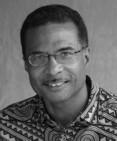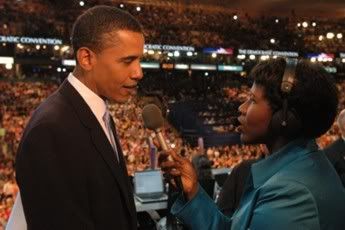Barack Obama: Dreams of an African Ancestor
Throughout the 2006 elections everybody was talking about Barack Obama, and everybody was asking the question, will Obama run for president in 2008? I'd like to to turn the question on its head somewhat, and try to look at Obama's rise to prominence from the perspective of his father, the perspective of an African ancestor...
Barack Obama and the Dreams of an African Ancestor
Now that the election results are in and we have witnessed a historic transfer of power in Congress (or “peaceful overthrow of the government,” as a lawyer-activist friend of mine says) pundits and commentators are naturally speculating about the mood of the country and the 2008 Presidential election. For the Democrats, the undisputed star of the 2006 elections was Barack Obama, who seemed to take the political world by storm. The charismatic Illinois senator broke fundraising records and made his presence felt as he stumped for just about every Democratic candidate who was locked in a critical or not-so-critical race. Jockeying for prime position in the national spotlight, Obama shrewdly timed a 13-city promotional tour for his book, The Audacity of Hope, to coincide with the most crucial part of the campaign season. Obama also used the Congressional August recess to travel to Africa, generating international publicity while making important stops in South Africa, Djibouti, Ethiopia and his father’s ancestral home of Kenya.
If Americans didn’t know Barack Obama’s face before his Africa trip, by October just about everyone caught a glimpse of him through various media outlets, from the covers of Time, Vogue and Vanity Fair to heavyweight television shows like Oprah Winfrey, Larry King Live and Nightline. Obama symbolized new hope and possibilities for the Democratic Party, and suddenly tongues started wagging about the first Black president of the Harvard Law Review making a very realistic bid to become the first Black president of the United States. Conservative New York Times columnist David Brooks urged Obama to run, paying him a compliment by saying that any Republican nominee should at least have to earn the distinction of beating Barack Obama. But his liberal colleague Maureen Dowd chided Obama for being caught up in the glamour of his own celebrity without settling down to the hard work of “being a man of history” and declaring his candidacy.
Interestingly enough, reaction among African Americans to Barack Obama and his presidential aspirations has been more mixed than one might expect. Before the elections, columnist Earl Ofari Hutchinson proclaimed that Obama is “not the right tonic for Democrats” to win the presidency in 2008. Hutchinson pointed to Obama’s youthful inexperience, and a fear that the Republican South would not respond kindly to the idea of a Black president. Looking more deeply into African American perceptions about Obama’s candidacy, I was surprised to find considerable ambivalence or even outright resistance to the senator’s meteoric rise to media prominence. One writer described what he called "the Wayne Brady factor” with Black folks, who automatically become suspicious when they see a Black man being adored by White people. On one message board I made a comment about Obama being an intellectual, and another brother corrected me. “W.E.B. Du Bois was an intellectual. Franz Fanon was an intellectual. This n----a just got some hype.”
It later dawned on me that traditional African-American civil rights activists and community leaders might be uncomfortable with Obama because he breaks the oppositional mold and represents a new kind of Black political leader who has a broader focus and wide appeal. Obama has so many dimensions to his background and personality – a White mother from Kansas and an African father from Kenya, community organizer in Chicago’s inner-city, exemplary Harvard Law scholar – that people become befuddled when they try to fit him into their preconceived notions about politicians. A friend of mine who is Black and White and pointedly insists on describing Tiger Woods and himself as “interracial,” cynically wonders why the media should get excited about a potential presidential candidate just because he happens to be “interracial.” But Obama seems to distance himself from Tiger Woods’ philosophy of racial identification; among White crowds Obama refers to himself as a “Black guy” and among Black crowds he describes himself as a “brother.” Obama’s chameleon-like persona seems natural and without pretense; many journalists are fascinated by his ability to engage large crowds with an authentic, affable, “conversational” style. Both of his books, The Audacity of Hope and his autobiography, Dreams from My Father, read as intimate yet sophisticated and lucid conversations on complex topics viewed from his own personal experiences. Time columnist Joe Klein describes Dreams from My Father as possibly “the best-written memoir ever produced by an American politician.” Obama’s books illuminate the motivations and insights of a remarkably intelligent man who is very comfortable navigating the high-speed post-modern cultural and technological forces that are reshaping American society.
Barack Obama is often criticized as being inexperienced, long on speeches and media publicity and short on actual legislative accomplishments. Some critics note that his political views are not particularly innovative or visionary, but rather reflect the standard ideas and positions that liberal Democrats have been espousing for years. Others tend look at the hard possibilities of winning Southern states, and are skeptical that Obama is up to the task, at least for the upcoming 2008 election. But whatever Obama may be lacking in legislative experience, he compensates for with sheer intelligence and motivational idealism. A Barack Obama presidential candidacy would be good for the nation, pushing the envelop of what Americans believe is possible, as Americans – especially African Americans – have always found a peculiar excitement in breaking barriers. Ironically, Barack Obama may be the only Democrat with the charisma and magnetism to challenge the near mythical hero status of Republican candidates like former New York City mayor Rudy Guiliani and Senator John McCain. Obama’s greatest strength may lie in his seemingly unique ability to identify with different sectors of America’s society, perhaps even including evangelicals. As a community organizer in Chicago, Obama found his home in the Black church, and is comfortable talking about religion during his political speeches. Obama even devoted an entire chapter in The Audacity of Hope to the subject of “Faith.”
As I watch Obama’s carefully crafted chessboard moves within the media spectacle surrounding his life, I can’t help wondering about the one dimension of his life that may be the least well-known or understood. I can’t help thinking about his African ancestry, and what his father, Barack Hussein Obama Sr., might feel about his son’s political fortunes were he alive today. I find myself captivated by the looming figure of Barack Obama’s father and his African origins.
Barack Obama the elder was born into the Luo tribe in Nyangoma-Kogelo in 1936, a small village in rural western Kenya. Inasmuch as a son’s destiny is connected with his father, the American Obama’s story really begins in this remote part of Africa, when missionary schoolteachers noticed a certain young African’s precocious intelligence, and sent him to a boarding school in Nairobi. The bright young man distinguished himself again in Nairobi, and was selected among the most promising Kenyan students of his generation to attend American universities. Barack Hussein Obama Sr. went on to receive scholarships from the University of Hawaii – where he earned his bachelor’s degree graduated at the top of his class – and Harvard, where he received a master’s degree in economics.
Barack Obama Sr. returned to Kenya in 1963, during the early years after independence, when many of Africa’s great leaders, such as Kwame Nkrumah of Ghana, Julius Nyerere of Tanzania and Jomo Kenyatta of Kenya – had bright visions about their nations’ futures. Armed with his ambition and his Harvard credentials, Barack Obama Sr., a Luo, was assigned to a top government position, only to see president Jomo Kenyatta appoint a less-qualified fellow Kikuyu tribesman to become Obama’s charge. The move infuriated Obama Sr., who complained loudly that tribalism was going to be the downfall of the new Kenyan nation. But Jomo Kenyatta – the proud founding father of Kenya – reportedly told Obama Sr. that he would never find a job in Kenya again, and closed ranks against the brilliant Harvard economist. Kenyatta’s vengefulness made earning a livelihood and providing for his family extraordinarily difficult for Obama Sr., and this is one of the heartbreaking stories in Dreams from My Father. One can easily see why Barack Obama Jr. has spoken out forcefully against corruption in Africa, even to the point of addressing the Kenyan Parliament during his recent African trip about the intertwined problems of corruption and tribalism.
Although Obama’s speech stirred some controversy, his visit to Africa was overwhelmingly successful. Obama engaged in dialogues with South African leaders, and in Kenya he drew huge, adulating crowds wherever he went. Many Kenyans, one would assume, cannot help being proud of the fact that their “favorite son” could possibly win election to the most powerful office in the world. Surely the most educated and sophisticated Africans, as well as the most humble, know that Obama’s potential success portends well for Africa, the developing world and the international community. One can perhaps imagine the spirit of Barack Obama Sr., silently urging his son to live up to his talent and potential, and to fear nothing in a society that is supposed to be built upon individual freedom and merit. Like his father before him, Barack Obama is pushing the envelop, striving to fulfill his ambition. Judging from the results of the 2006 elections and Obama’s role in the Democrats’ success, there are many Americans who would like to see this highly gifted and compassionate African American become the next president of the United States.



0 Comments:
Post a Comment
<< Home